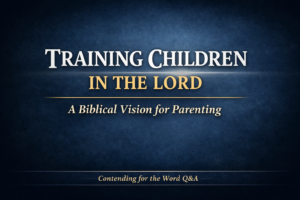⏱️ Estimated Reading Time: 11 min read
When we begin to think about the question, “What is a ‘biblical sexual ethic’?” we must first take a look at Genesis 1 with God creating Adam. There we see that man is not an accident; God made Adam from the dust, fashioned him in His likeness and breathed life into his lungs. Man is an intentional and purposeful creation of the Creator God. And not only that, when we turn to the next page to Genesis 2, we see that God saw that it was not good for man to be alone. And that’s significant, because Adam was the leader in the Garden. He was doing hard work and needed companionship and someone to “do life” with. And so, God created for Adam his wife, Eve, using one of his ribs, to be his helpmate.
What I just walked you through is one of the most controversial passages in the Scriptures in our culture today. It shouldn’t be, but it is. And we begin here with God creating, because it is here that He establishes the rules for a biblical sexual ethic. A biblical sexual ethic starts between one man and one woman, for life.
Many people in our culture say, “No, that is wrong.” A biblical sexual ethic teaches that a man is to be a man, and a woman is to be a woman. And by doing so, they reflect the Creator in their specific gender. A man isn’t to become a woman. A woman isn’t to become a man. Doing so is an affront against the Creator. And so, we need to make clear to people that there is a difference between a man and a woman if we are going to help them understand the framework of a biblical sexual ethic.
Sadly, though, we live in a culture that Paul describes in many places, but specifically in Romans 1; a culture that worships the creature rather than the Creator. All you have to do is go through the grocery line at your store, and you can see this statement proved by a glance at the cover of certain magazines near the register. Or, you can see this if you go down to the beach, to any mall at any place in the world, or on the internet where there are videos and images by the millions and growing. And it’s into this precise situation that a biblical sexual ethic needs to be proclaimed.
In 1 Timothy, Paul desires to ensure that Timothy proclaims sound doctrine and that it is preserved. His instruction to Timothy is beneficial. He is to teach sound doctrine (1 Timothy 1:3; 5:17; 6:3-5), raise up leaders who are able to teach sound doctrine (1 Timothy 3:2), command sound doctrine (1 Timothy 4:11, 13, 16), and guard sound doctrine (1 Timothy 6:20). To do so is not a trite or secondary matter to Paul, it is a gospel issue (1 Timothy 1:11).
Many people are telling us that doctrine doesn’t matter. And yet, Paul’s instruction to Timothy is telling: doctrine matters. The famous Martyn Lloyd-Jones taught through a series he entitled, Great Doctrines of the Bible, for this precise reason. Lloyd-Jones, a medical doctor, was trained to diagnosis patients and to give them the right remedy. To Lloyd-Jones, as a pastor to fail to provide the correct diagnosis and to deliver God’s people the proper treatment was to fail in his task. And it’s the same today for pastors and ministry leaders. Paul’s instruction to Timothy is binding to us today because of the inspired, inerrant, sufficient, clear, and authoritative Word of God. To fail in this is to fail in our task. And this is vital because sound doctrine matters, but it matters because it enables right-living before the face of God.
We are seeing many people abandon a biblical sexual ethic because they don’t believe in the Word of God. Instead, they think that they can redefine or even remove biblical sexual ethics from the Bible. And to do so is to rip out Paul’s instruction on many matters related to the Christian life. For example, how can we know about the fruits of the Spirit? In the context of talking about the fruits of the Spirit, Paul talks about biblical morality. Furthermore, when talking to the Corinthians (1 Corinthians 6), Paul talks to them about biblical sexual ethics. So, we would have to rip 1 Corinthians 6, and Galatians 5, right out of our Bibles. And we would have to take out Colossians 3, and many other passages in the Bible, including vast portions of the Old Testament law that teach about biblically informed sexuality and ethics.
And yet, we see this redefinition all over the place on biblical sexuality and biblical sexual ethics, precisely because people don’t believe in sound doctrine. They have doctrine, make no mistake about it, but it is not biblical doctrine. Such doctrine is not binding on people’s lives because it originates in people’s minds and hearts, and not in the Word of God. Defining orthodoxy often focuses on how we feel, rather than on what the Bible teaches. Doing so gives the wrong diagnosis and thus offers the wrong remedy. The right remedy is—to begin with—what the Bible teaches, because the Bible also provides the proper remedy in the gospel of the Lord Jesus.
Paul right out of the gate charges Timothy to “charge certain persons not to teach any different doctrine” (1 Timothy 1:3). He goes on to explain to Timothy people who were setting themselves up as teachers of sound doctrine. Paul goes on to describe these false teachers, describing them as those who make confident statements they do not understand nor do they know anything (1 Timothy 3:7).
Paul gives the right and wrong use of the law, tackling those things false teachers were either failing to teach or were contradicting with their lives. 1 Timothy 1:8-11 states, “Now we know that the law is good, if one uses it lawfully, understanding this, that the law is not laid down for the just but for the lawless and disobedient, for the ungodly and sinners, for the unholy and profane, for those who strike their fathers and mothers, for murderers, the sexually immoral, men who practice homosexuality, enslavers, liars, perjurers, and whatever else is contrary to sound doctrine, in accordance with the gospel of the glory of the blessed God with which I have been entrusted.”
Earlier, I explained how biblical sexuality and biblical ethics are under attack, but it’s also important to note how both of those points, lead to the heart of biblical morality. If we abandon biblical sexuality and a biblical sexual ethic, what we are doing is abandoning any framework for biblical morality. And if we have no biblical morality, then why would we ever care how we live before the face of God? Why would we care about sexuality at all? And this is precisely the point, many people today don’t care. They call themselves Christians but live in open rebellion against the God they say they believe in the Bible. They live lives filled with pornography, sex outside of marriage, and many other things that are outside the bounds for a Christian.
According to Paul in 1 Timothy 1:8-11 this list of sins, a list that includes murder, homosexuality, enslavement, lying, also adds, “whatever else is contrary to sound doctrine.” Paul’s statements in 1 Timothy 1:11 should genuinely get our attention. Paul’s definition of sound doctrine is opposed to the vice list of 1 Timothy 1:8-10 is such that it is “in accordance with the gospel of the glory of the blessed God with which I have been entrusted.”
The gospel is itself the fountainhead of sound doctrine. If we get the foundation wrong, then every other part will crumble and fall. For example, if we are wrong on the creation, namely, how God created men and women, how then can we understand what happens in Genesis 3? And if we don’t know what happens in Genesis 3 how can we begin to understand what happens in the rest of the Old Testament and even in the New Testament? The answer is we can’t. When they put in the foundation for a house, it’s one of the essential aspects of the home. It has to be strong. It has to be right. And the same is true with the gospel. That is how deadly serious it is that sound doctrine matters. It matters because it gives us the right foundation to build the rest of our doctrine and theology. Sound doctrine entails sound biblical ethics. To compromise on biblical ethics- same-sex marriage, abortion, etc. is to compromise sound doctrine, which 1 Timothy 1:11 says is to compromise the gospel of the Lord Jesus.
Christian ethics is not an agree to disagree issue. The Nashville Statement from the Council on Biblical Manhood is clear on Article X on this matter:
“WE AFFIRM that it is sinful to approve of homosexual immorality or transgenderism and that such approval constitutes an essential departure from Christian faithfulness and witness.”
“WE DENY that the approval of homosexual immorality or transgenderism is a matter of moral indifference about which otherwise faithful Christians should agree to disagree.”
If we say that this is an agree to disagree point as Christians, we are missing Paul’s position and denying the foundation for Christianity, the gospel. Paul’s teaching is clear; we are to confront false teaching wherever it is that does not go along with the “Gospel of the blessed God” who we not only believe but have been entrusted with His Word.
You and I are living in a culture that places its feelings at the forefront. In many ways, feelings are the doctrine of our culture. Every single person R.C. Sproul once remarked is a theologian; the question is whether they are a good theologian or a bad theologian. And bad theologies exist, because of bad theologians. They perpetuate unsound doctrine because they are not sound. They do not believe the gospel. And this is precisely what we are seeing in our culture, even in many quarters of the church. People are opposed to the God of the Bible, the God they say they love is opposed to what they believe on matters related to same-sex marriage, abortion, homosexuality to name a few things. And yet these people continue, undeterred by teaching false doctrine. They are unafraid; they have no fear of God. They are, to put it bluntly not converted. They are not regenerate. They are false teachers perpetuating false doctrine because they don’t believe in the God they say they believe.
Our response to such people should be to continue to preach the Word in season and out of season. We must, in a culture that is greatly confused about biblical sexuality, preach the Word. It is not a matter of our opinion; it is a matter of the authority of God’s Word. God’s Word teaches this about biblical sexuality and biblical sexuality, and so we stand opposed to the position of homosexuality, same-sex marriage, transgenderism, and so on.
We do so not because we are opposed to image bearers, we do so because we are opposed to those who teach contrary to sound doctrine. We are not against people themselves, we are against the positions they hold, and so we continue to proclaim lovingly and biblically that the truth matters. And that is a matter of love to confront error. It is also a matter we should pray about. Because the truth matters, people matter, and we as Christians are called to love God and people. We must not only proclaim but pray for those who are lost that the Lord would open their eyes to the truth of the Word and smash their opinions and unsound doctrine into a million pieces, and reveal their utter need for the Savior, who bled, died, was buried and rose again for them.
Only the Lord can illuminate the truth of the Word by the Holy Spirit, but we must be faithful. We must stand fast. And we must proclaim sound doctrine, sound living, and sound ethics, and morality matter. If we don’t, we fail, in our task, in our mission to make disciples. And so this is desperately urgent and needed because we have been given the diagnosis about the human race, we are sinners by nature and by choice, but also the remedy- there is hope in Christ alone, through faith alone by grace alone. So let us stand, and proclaim with urgency, even if people don’t want to hear, the message that sound doctrine, sound living, biblical morality, biblical sexuality, and the whole counsel of God matters with passion, with all we are, to the glory of God, even as we live before the face of God.
Dave Jenkins is happily married to his wife, Sarah. He is a writer, editor, and speaker living in beautiful Southern Oregon. Dave is a lover of Christ, His people, the Church, and sound theology. He serves as the Executive Director of Servants of Grace Ministries, the Executive Editor of Theology for Life Magazine, the Host and Producer of Equipping You in Grace Podcast, and is a contributor to and producer of Contending for the Word. He is the author of The Word Explored: The Problem of Biblical Illiteracy and What To Do About It (House to House, 2021), The Word Matters: Defending Biblical Authority Against the Spirit of the Age (G3 Press, 2022), and Contentment: The Journey of a Lifetime (Theology for Life, 2024). You can find him on Facebook, Twitter, Instagram, Youtube, or read his newsletter. Dave loves to spend time with his wife, going to movies, eating at a nice restaurant, or going out for a round of golf with a good friend. He is also a voracious reader, in particular of Reformed theology, and the Puritans. You will often find him when he’s not busy with ministry reading a pile of the latest books from a wide variety of Christian publishers. Dave received his M.A.R. and M.Div through Liberty Baptist Theological Seminary.




